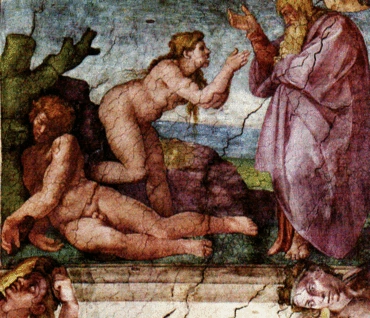Explanation of Genesis 2:22
By Brian David

The Lord is life itself. We are recipients of life. We give life unique forms because of our unique shapes as receptacles, and through free will we can choose how fully we will receive life. But we don't have life of our own. It follows from this that the more we turn toward the Lord and receive life, the more alive we will be; and the more we turn away the more dead we will be. It also follows that believing life is our own – with all the loves, the thoughts and the power that entails – is actually the antithesis of life.
This is the state of those in the deepest hells, who reject everything of the Lord, even His existence, and claim all life as their own. They are, in fact, only alive because the Lord forces life on them in the amount necessary to sustain existence.
This is, in a sense, what is represented by the rib – which is human, and is alive, but only in the most limited way. When the people of the Most Ancient Church (Adam) wanted to lead themselves and sense life as their own, the Lord had to use that most dead aspect of them to grant their wish. He had to use that bone, which represents our most hellish potential, what we would be if we were to reject the Lord completely.
But then the Lord did something miraculous. He turned that bone into living flesh, into a new person: the woman Eve. This represents that the Lord built that most dead, most hellish aspect of us up into something which felt life as its own, but could acknowledge that life actually came from the Lord, and could thus again be a recipient of life. It wasn't quite as pure as before; people could no longer commune directly with the Lord. But they had what they wanted instead: a sense of self.
The Writings call this – both the rib and the woman – by the Latin word proprium, essentially meaning "as of self." The rib represents the proprium on its own, which is hellish. The woman represents the proprium given life by the Lord.
(Notae: Arcana Coelestia 151, 152, 153, 154, 155)
Arcana Coelestia #3677
3677. 'The brother of Rebekah, Jacob and Esau's mother' means the relationship through the mother of the good of truth, represented by 'Jacob', with the truth of good, represented by 'Esau'. This is clear from the representation of 'Rebekah' as the Lord's Divine Rational as regards Divine Truth, often dealt with already, from the representation of 'Jacob' as the good of truth, or good which springs from truth in the natural, and from the representation of 'Esau' as the truth of good, or good from which truth springs in the natural, dealt with above in 3669. And seeing that all goods and truths which exist in the natural or external man are conceived and born from the rational or internal man, that is to say, from the good of the rational as the father, and from the truth of the rational as the mother, 3314, 3573, 3616, those words therefore mean a relationship through the mother of the good of truth, represented by 'Jacob', with the truth of good, represented by 'Esau'. This is exactly how they are related to one another.
[2] But to explain these things intelligibly is extremely difficult, the reason being that the most general features of this matter are not known at the present day, such as what spiritual good is and what the truth that goes with it is, and that there are countless genera of good and accompanying truth, and still more countless species, and also that there are degrees of them which are interconnected like those of blood relationships and relationships by marriage. While these very general features remain unknown a description of degrees and relationships would not be at all clear to anyone, especially at the present day when the learned have no wish to know those things. For these do not like to go beneath the surface of these matters and discuss the nature of them, only whether they exist or not. And as long as that is their state they have no wish at all to know anything about those countless kinds of good and truth.






